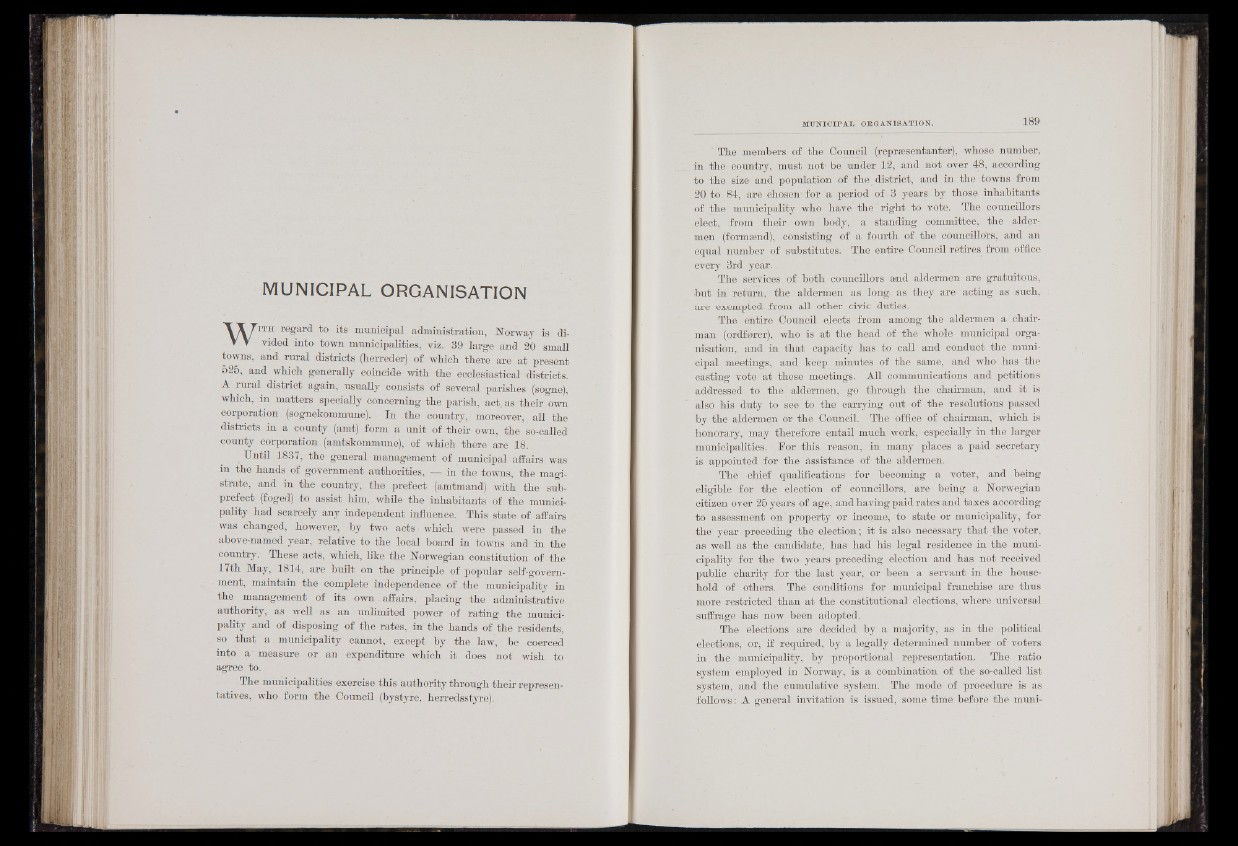
MUNICIPAL ORGANISATION
Wi t h regard to its municipal administration, Norway is divided
into town municipalities, viz. 39 large and 20 »™.ll
towns, and rural districts (herreder) of which there are at present
525, and which generally coincide with the ecclesiastical districts.
A rural district again, usually consists of several parishes (sogne),
which, in matters specially concerning the parish, act. as their own
corporation (sognekommune). In the country, moreover, all the
districts in à county (amt) form a unit of their own, the so-called
county corporation (amtskommune), of which there are 18.
Until 1837, the general management of municipal affairs was
in the hands of government a u t h o r i t i e s , i n the towns, the magistrate,
and in the country, the prefeet (amtmand) with the subprefeet
(foged) to assist him, while the inhabitants of the municipality
had scarcely any independent influence. This state of affairs
was changed, however, by two acts, which were passed in the
above-named year, relative to the local board in- towns and in the
country. These acts, which, like the Norwegian constitution of the
17th May, 1814, are built on the principle of popular self-government,
maintain the complete independence of the municipality in
the management of its own affairs, placing the administrative
authority, as well as an unlimited power of rating the municipality
and of disposing of the rates, , in the hands of the residents,
so that a municipality cannot, except by the law, be coerced
into a measure or an expenditure which it does not wish to
agree to.
The municipalities exercise this authority through their representatives,
who form the Council (bystyre, herredsstyre).
The members of the Council (repræsentanter), whose number,
in the country, must not- be under 12, and not over 48, according
to the size and population of the . district, and in the towns from
20 to 84, are chosen- for a period of 3 years by those inhabitants
of the municipality who have the right to vote. The councillors
elect, from their own body, a standing committee, the aldermen
(formænd),' consisting of a fourth of the councillors, and an
equal number of substitutes. The entire Council retires from office
every 3rd year.
The services of both councillors and aldermen are gratuitous,
•but in return, the aldermen as long as they are acting as such,
are exempted from all other civic duties.
The entire Council elects from among the aldermen a chairman
(ordferer), who is at the head of the whole municipal organisation,,
and in that capacity has to call and conduct the municipal
meetings, and keep minutes of the same, and who has the
casting vote at these meetings. All communications and petitions
addressed to the aldermen, go through the chairman, and it is
also his duty to see to the carrying out of the resolutions passed
by the aldermen or the Council. The office of chairman, which is
honorary, may therefore entail much work, especially in the larger
municipalities. For this reason, in many places a paid secretary
is appointed for the assistance of the aldermen.
The chief qualifications for becoming a voter, and being
eligible for the election of councillors, are being a Norwegian
citizen over 25 years of age, and having paid rates and taxes according
to assessment on property or income, to state or municipality, for
the year preceding the election ; it is also necessary that the voter,
as well as the candidate, has had his legal residence in the municipality
for the two years preceding election and has not received
public charity for the last year, or been a servant in the household
of others. The conditions for municipal franchise are thus
more restricted than at the constitutional elections, where universal
suffrage has now been adopted.
The elections are decided by a majority, as in the political
elections, or, if required, by a legally determined number of voters
in the municipality, by proportional representation. The ratio
system employed in Norway, is a combination of the so-called list
system, and the cumulative system. The mode of procedure is as
follows : A general invitation is issued, some time before the muni